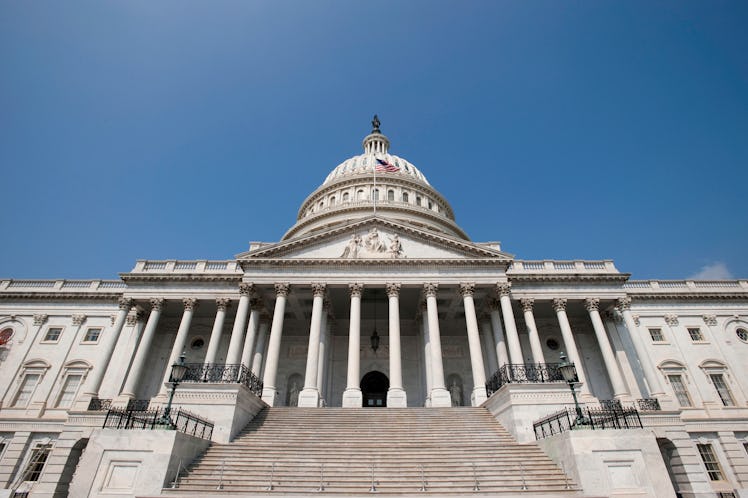
Here's What You Should Know About The Filibuster & Why It Matters
For the first time in two decades, the Senate chamber is split 50-50, and new Senate Majority Leader Chuck Schumer and new Minority Leader Mitch McConnell are already butting heads. America's first congressional clash under the administration of President Joe Biden was settled on Jan. 26, as McConnell relented on his demand that Democrats maintain the Senate filibuster rule — effectively putting an end to an early partisan gridlock. But what is a filibuster, how does it work, and how would it affect Biden's agenda as president? Here's what's up with the latest congressional fight.
Because of the Jan. 5 Senate runoff elections, in addition to Vice President Kamala Harris' position as tie-breaker, Democrats have effectively gained control of the Senate in 2021. While a Democratic majority is ideal for Biden, seeing as how it would help him pass a COVID-19 relief package and other much-needed legislation, Republicans still have one handy tool to obstruct the president's agenda: the Senate filibuster.
According to the U.S. Senate, "a filibuster is an attempt to block or delay Senate action on a bill or other matter" through debate, which in practice usually means that some determined politician stands up and talks for hours on end (or, more normally, just threatens to do so) to prevent moving forward. It can go on indefinitely — that is, until cloture is invoked. The Senate cloture rule limits filibusters to just 30 hours of additional debate before requiring lawmakers to move to a decisive vote. However, 60 Senate members are needed to be on board invoke it, which effectively requires bipartisan support to get someone to sit down, shut up, and quit filibustering. While there are some exceptions, that high threshold for cloture means the filibuster can often be used as a way to stonewall legislation, since anyone who opposes a bill is unlikely to vote to end debate.
Ultimately, that could pose a problem for Biden's early agenda. Progressive groups have put pressure on Democratic leaders to reform or eliminate the Senate filibuster rule as early as March 2020, and progressive members of Congress have followed suit — urging Biden to prevent Republicans from using the filibuster to obstruct legislation. When hashing out the terms of a new 2021 power sharing agreement (modeled after the The 2001 Senate Powersharing Agreement) for a rare 50-50 congressional makeup, Schumer and McConnell reached a sticking point: McConnell wanted to keep the filibuster in place. In a Jan. 23 interview with NBC, Sen. Dick Durbin criticized McConnell's demand to retain the filibuster. "If we gave him that, then the filibuster would be on everything, every day," Durbin said. Several other congressional Democrats agreed, including Minnesota Rep. Ilhan Omar, and Massachusetts Sen. Ed Markey.
In a Jan. 21 speech on the Senate floor, McConnell demanded the filibuster rule remain untouched. "I cannot imagine the Democratic leader would rather hold up the power-sharing agreement than simply reaffirm that his side won't be breaking this standing rule of the Senate," he said. On Jan. 26, however, he stepped down from the stalemate when two Democrats, Sens. Joe Manchin and Kyrsten Sinema, assured him they would not do away with the rule. "The legislative filibuster was a key part of the foundation beneath the Senate's last 50-50 power-sharing agreement in 2001," McConnell said in a Jan. 25 Senate address, voicing his approval of the compromise. "With these assurances, I look forward to moving ahead with a power-sharing agreement modeled on that precedent."
Amid this congressional clash between party leaders, a 2005 video of Biden speaking about the Senate filibuster rule has since resurfaced. In it, the president (only a Delaware senator then) states that "the filibuster is not about stopping a nominee or a bill," but rather, "it is about compromise and moderation." The roles were reversed at the time: Democrats were filibustering President George W. Bush's nominees to appellate courts, and the Republican Party threatened to compromise the filibuster rule. This was avoided, however, through a bipartisan deal to invoke cloture among the Senate.
The Senate filibuster rule has been in place since the mid 1800's, and has facilitated countless compromises on legislation since then. With a fiercely divided Senate — and nation — it's clear Biden will have to make a lot more room for compromise in the future.